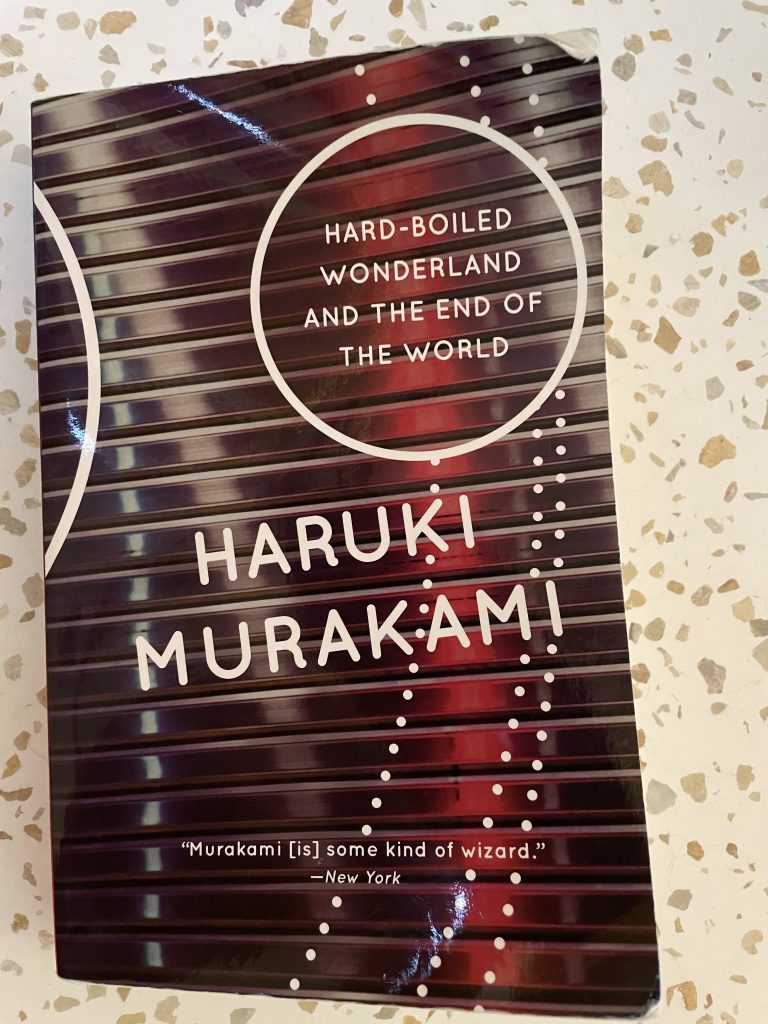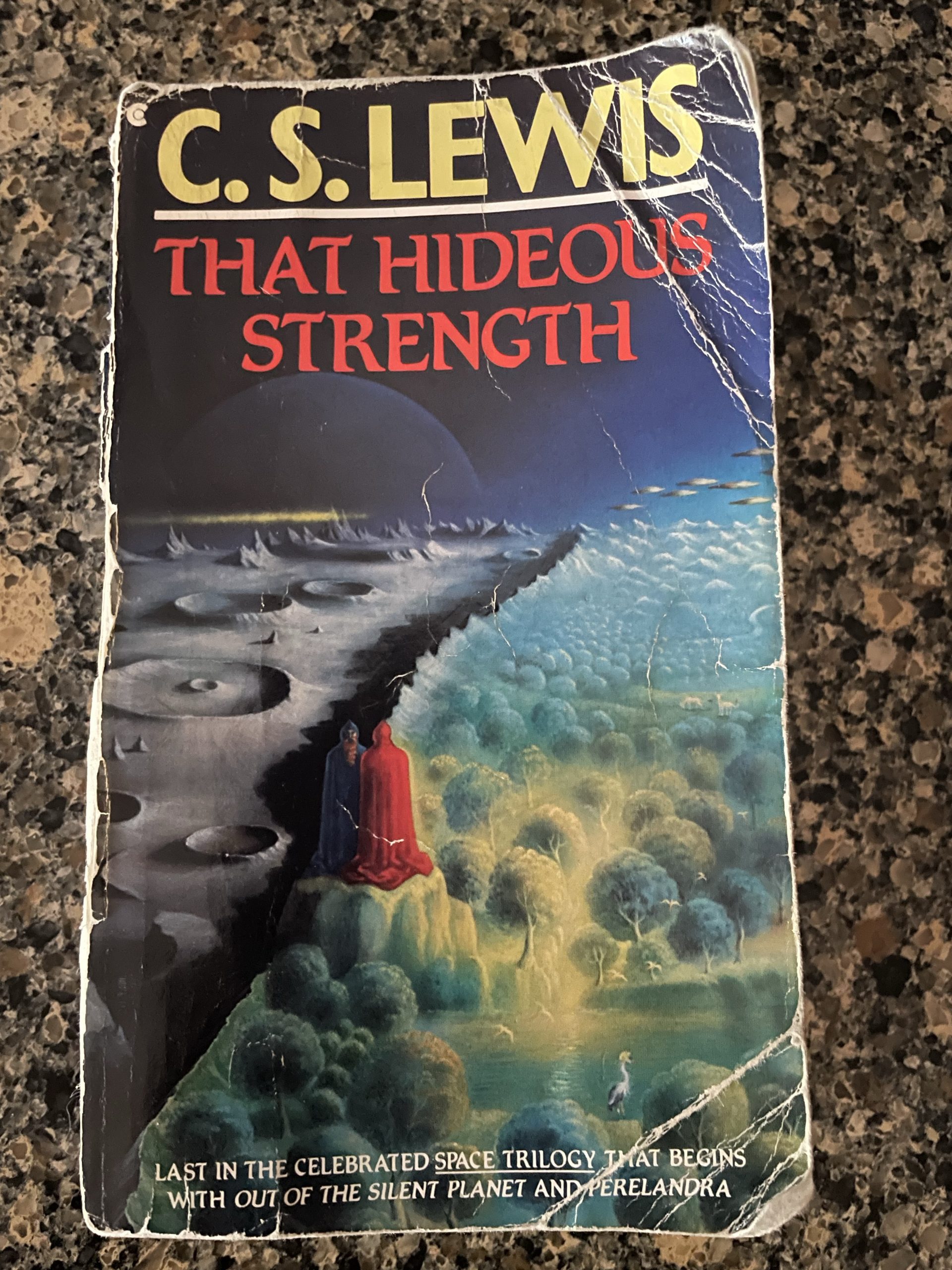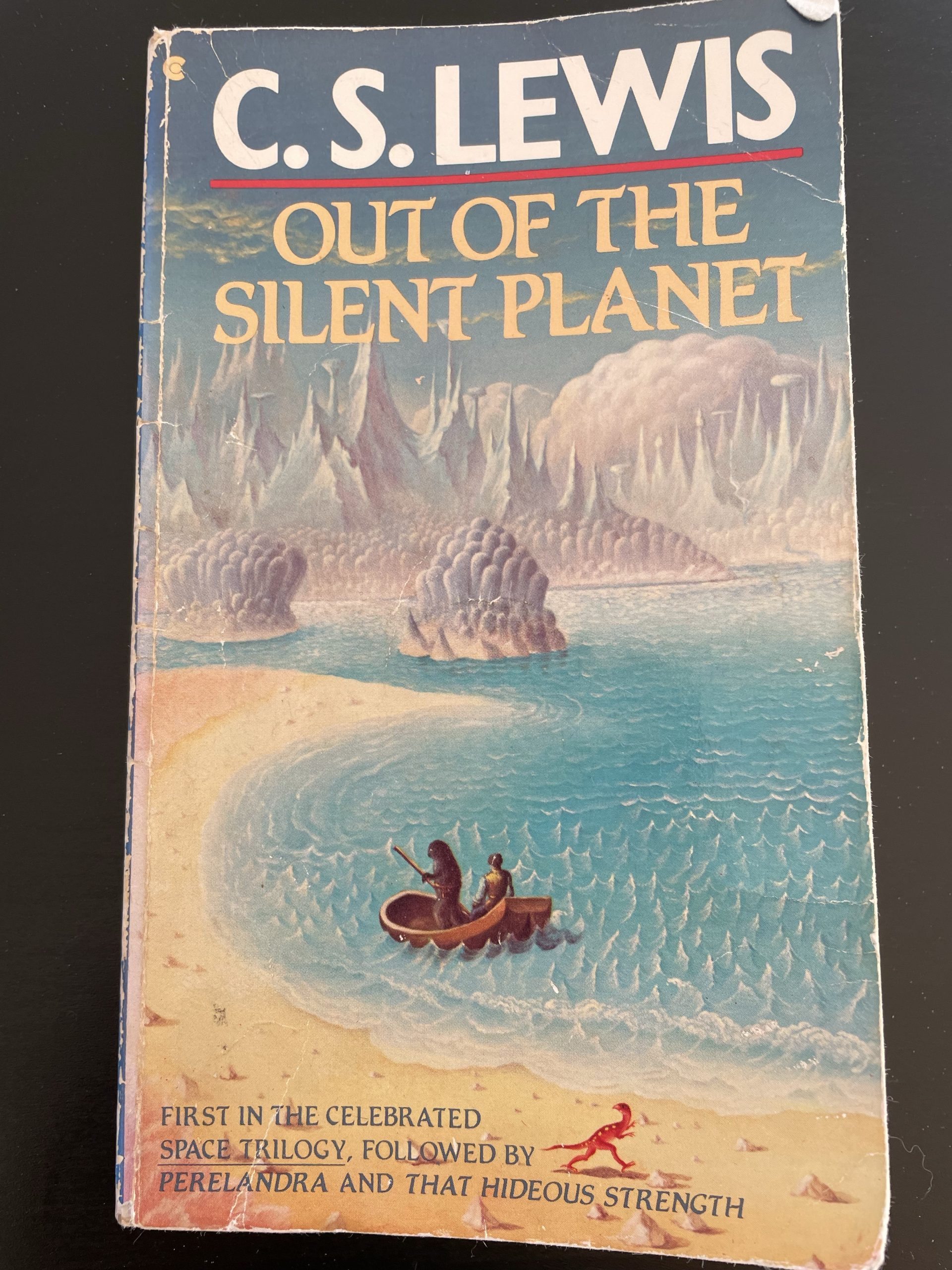Non American Story
HOOD, by Stephen Lawhead, A No-Spoiler Review
Last fall, I needed to restock my Little Free Library, so headed to the local Goodwill to see what sci-fi, fantasy or dystopian fiction they had on hand. (My LFLibrary is filled with these genres only). I did find some great treasures, including this Stephen Lawhead book that I had never heard of. I began reading it sometime in the winter and got hooked. I knew of Lawhead because of reading the Pendragon Cycle sometime in my 20s. HOOD is book one in the King Raven Trilogy.
HOOD is the first book in a trilogy that follows a character based on the Robin Hood myth/legend.
Short Review of HOOD
I highly recommend this novel. Here’s why:
- Stephen Lawhead (author of The Pendragon Cycle…a version of the Arthurian Legend) is an accomplished writer who knows how to capture the voice of medieval and pre-medieval Brits.
- His world-building feels rooted in history, authentic
- The language engages…everything from the quirky colloquialisms, to the names of characters
- The characters are well developed, even the evil ones, and draw you into their world of struggle and heroism
- Woven into the story are Christian themes and prayers, which some won’t like, but I absorbed as authentic
- Rated PG (for medieval violence, think swords and bow and arrow…but no graphic sex or sexual violence)
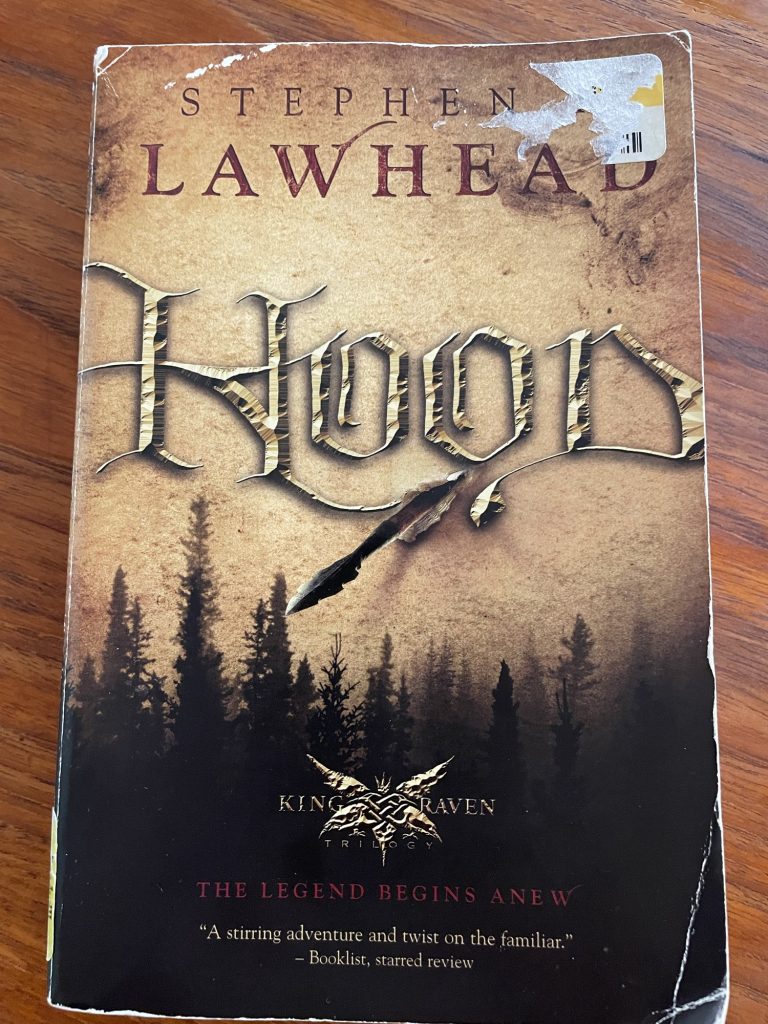
The Longer Review:
If you’re reading this novel, I recommend flipping to the back of the book and reading his essay: Robin Hood in Wales? It’s past the epilogue (don’t read the epilogue or you will spoil the story).
In this essay, Lawhead discusses why he sets HOOD in Wales, playing with the idea that the legend of Robin Hood had been around and circulating through the British Isles for a very long time before the general population associated him with Sherwood Forest. Here is a bit of that essay:
It will seem strange to many readers, and perhaps even perverse, to take Robin Hood out of Sherwood Forest and relocate him in Wales; worse still to remove all trace of Englishness, set his story in the eleventh century, and recast the honourable outlaw as an early British freedom fighter. My contention is that although in Nottingham, the Robin Hood legends found good soil in which to grow, they must surely have originated elsewhere.
The character we now know as Robin Hood can be traced as far back as the early 1260s. By 1350, the Robin Hood legends were well-known, if somewhat various, consisting of a loose aggregation of poems and songs plied by the troubadours and minstrels of the day. These poems and songs bore little relation to one another. The first written references to and carried titles such as “Robin Hood and the Potter,” “Robin Hood’s Chase,” “Robin Hood and the Bishop of Hereford,” “the Jolly Pinder of Wakefield,” The “Noble Fisherman,” “Robins Whood Turned Hermit”…
So, Lawhead poses the possibility that Robin Hood (or Rhi Bran Hud, as he is called by his Norman enemies) is a deposed Prince/King who is rallying his people to push back against the Norman Invasion? He fights a guerilla war with long bows and hides in the wild forests of the March, attacking and tormenting the French who cannot defeat this clever and courageous rival.
A comment about the Christian themes in this novel. The church and state are intermingled throughout Europe during this time in history. The Norman Kings are closely aligned with church. In 800 CE, Charlamagne is crowned by the pope as the Holy Roman Emperor. Kings are seen and dubbed as God’s holy vessels to lead the people. The church holds much power in this system and therefore becomes the vehicle for distributing blessing but also horrible injustice. Lawhead has been careful to look at source material as he weaves church and state together in his books. He also doesn’t sugarcoat the evil that was perpetrated by the church.
If you can enter into the world Lawhead has created and withhold judgment, realizing how different most of Europe was from the Post-Modern West, you can begin to understand something of the mindset of those who lived in this time period. Why did kings, for example, pay the church from their own treasury to atone for their sin of killing enemy soldiers and potentially damning them to hell? Why did priests go out with fighters to give them last rites before a battle? Reading Lawhead will put some of these questions into context. The link between the church and the king cannot be understated in a book that is attempting to portray authentic medieval culture.
Therefore, when I read HOOD I felt like I was reading historical fiction. It’s a kind of escape into fantasy, but not quite. Lawhead is so fluent in the language and history of this time period in Britain, that he transported me back a thousand years. This is an aspect of world-building that felt extremely enjoyable to me, which is why I recommend this book to readers of all ages.
THE CHILDREN OF MEN, A No-Spoiler Review of the novel by PD James
If you’re a person born before 1990, you’ve probably seen the film Children of Men, based on the novel by PD James. I recommend this novel, that falls within the boundaries of science fiction, without reservations. This book is rated PG and appropriate for young adults. The rating is due to adult themes and some violence. I’m guessing it would make a great audiobook…especially if you enjoy listening to British voice actors.
The Short Review. Why read when you can watch the film instead?
- I recommend you do both! I loved the film which adopted the premise of the book, but the novel is unique and interesting in a different way
- Beautifully written
- Decent tension and a mystery to solve
- Subtle ideas about Christianity (Anglicanism in particular) that only partially made it into the film
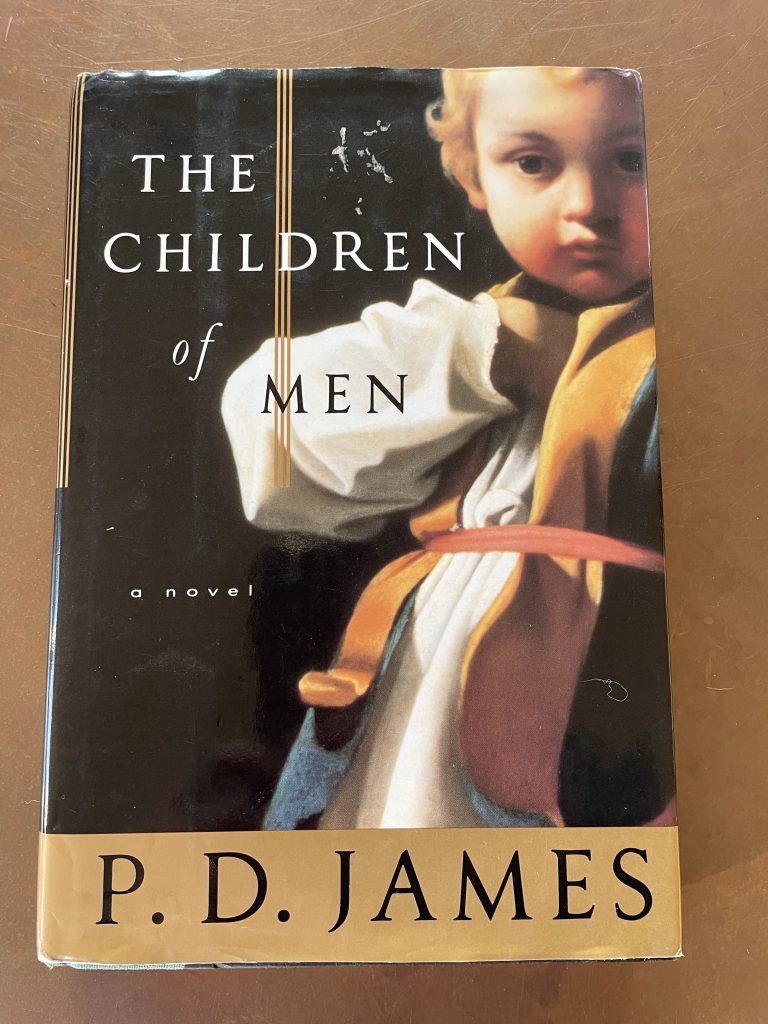
The Longer Review
Phyllis Dorothy James, Baroness of Holland Park, was a much beloved writer of primarily detective novels. Her first was published in 1962. It was later in her career, in 1992, that she wrote THE CHILDREN OF MEN. While this book is not exactly a detective novel, James unrolls the story with a similar template. She tells the story from the perspective of one man, Theodore Faron. Theo, as he is mostly called in the novel, is a fifty-year old professor of History at Oxford University. More importantly, the backdrop or the world in which he is living is aging and sterile. In the story (all set in England), no one has had a child for over twenty-five years.
The story opens with Theo’s journal entry about the violent death of the “last born” child on earth.
Early this morning, 1 January 2021, three minutes after midnight, the last human being to be born on earth was killed in a pub brawl in a suberb of Buenos Aires, aged twenty-five years, two months and twelve days. If the first reports are to be believed, Joseph Ricardo died as he had lived. The distinction, if one can call it that, of being the last human whose birth was officially recorded, unrelated as it was to any person virtue or talent, had always been difficult for him to handle. And now he is dead.
This book was an interesting read for me as a writer for a couple of reasons, one of which is the wobbly point of view part-way into the novel. First person journal entries in chapter 1-5. At the beginning of chapter 6, Theo grapples with his journal writing as a task in his overly-organized life that gave him no pleasure. So, in this chapter, Theo is still the primary “voice” of the story, but now telling the tale in 3rd person. In chapter 7, he’s back to a journal entry, therefore first person, and in chapter 8 and from here on out, the tale is a close 3rd POV, all from Theo’s perspective. I don’t think the average reader is disrupted by these slight shifts because Theo is still the storyteller. I noticed mainly because novice writers will sometimes shift like this accidentally and most editors would discourage these shifts. James pulls it off because of the “journaling” aspect of the beginning. I think she is using this to show Theo’s passivity. He observes and writes, but does not act. By chapter 8, he has fully made the decision to be a part of the story, not just an observer. He acts as a character in the unrolling narrative and will continue to do so until the end.
Another aspect of James’ writing that I enjoyed were her vibrant descriptions of faces and clothing. Long descriptions seem to be Theo’s favorite way (James’ favorite way) to judge/describe character. Of course, given the descriptions are coming from Theo, they also tell the reader about him. Regardless, I found myself enthralled by some of the descriptions, their length and detail…like this description of Jasper, a minor character and one of Theo’s older colleagues.
He was the caricature of the popular idea of an Oxford don: high forehead, receding hairline, thin, slightly hooked nose, tight-lipped. He walked with his chin jutting forward as if confronting a strong gale, shoulders hunched, his faded gown billowing. One expected to see him pictured, high-collared as a Vanity Fair creation, holding one of his own books with slender-tipped fingers.
Here is Miriam, a midwife and one the primary characters in the second half of the novel.
The woman was the only one to come forward and grasp Theo’s hand. She was black, probably Jamaican, and the oldest of the group, older than himself, Theo guessed, perhaps in her mid- or late fifties. Her high bush of short, tightly curled hair was dusted with white. The contrast between the black and white was so stark that the head looked powdered, giving her a look both hieratic and decorative. She was tall and gracefully built with a long, fine-featured face, the coffee-coloured face hardly lined, denying the whiteness of the hair. She was wearing trousers tucked into boots, a high-necked brown jersey and sheepskin jerkin, an elegant, almost exotic contrast to the rough serviceable country clothes of the three men. She greeted Theo with a firm handshake and a speculative, half-humorous colluding glance, as if they were already conspirators.
Science fiction is not always well-written in the literary sense, so it’s a pleasure to read a book like THE CHILDREN OF MEN, with literary flair on top of a good story.
Regarding the Anglican tidbits. I am a practicing Anglican as of 2018, so I was keying into the references. Theodore (whose name means God-lover) has a distant relationship with the faith of his people, but the reader encounters him coming more alive to this faith even as he moves toward more actions. In the world in which he is living, taking risks and acting, symbolize hope. Hope for a future is what the whole world has given up on. No science and knowledge has been able to solve the problem of humankind’s infertility. The idea of extinction and of God’s abandonment of his creation are stark in Theo’s understanding of the world. There is a beautiful moment, later in the story where a prayer is given from the Anglican book of common prayer over a dead friend.
Theo does the reading.
At first, his voice sounded strange to his own ears, but by the time he got to the psalm the words had taken over and he spoke quietly, with confidence, seeming to know them by heart. “Lord, thou hast been our refuge: from one generation to another. Before the mountains were brought forth, or ever the earth and the world were made: thou art God from everlasting, and world without end. Thou turnest man to destruction: again thou sayest, Come again, ye children of men. For a thousand years in thy sight are but as yesterday: seeing that is past as a watch in the night.”
Theo has awakened to the religion of his youth. It will play a large role in how he manages the final chapters of this gripping story.
HARD-BOILED WONDERLAND AND THE END OF THE WORLD. A No-Spoiler Review
Murakami. Ah Murakami.
I took up this science fiction novel because having read so much mainstream scifi in the last few years, I found myself pining for beautiful prose. Haruki Murakami did not disappoint and HARD-BOILED WONDERLAND AND THE END OF THE WORLD is not only an imaginative story that passes the muster of science fiction, but had me laughing out loud at various points.
This story is rated R for sexual content.
First, the short review.

6 Reasons I recommend HARD-BOILED
- Masterful storytelling, including a full-blown mystery embedded in the structure of the novel
- Beautifully drawn characters who not only feel true, but are likeable in their quirkiness
- An imaginative world where scifi touches magic realism
- Humor
- Gorgeous prose and great writing in general
- Unicorns
2 Reasons to Avoid HARD-BOILED
- If you only read sciency science fiction and could care less about prose…this book might not be for you
- If you need a straight-forward ending, this story does not have that
The Longer Review
Step into the world of Murakami, his imagination and his Japanese way of looking at life. In this novel, he alternates point of view chapter by chapter. He does not explain how the two POV’s are connected until close to the end. Both storylines are told in first person. Both protagonists are male in midlife. His easy prose and everyman protagonist give the fictional world not just shape and beauty, but allow for emotional access. This hero is not someone extraordinary and with super powers. He is any one of us caught in a dilemma. The story meanders through a Tokyo imagined, not exactly futuristic on the surface. People drive cars, listen to Bob Dylan cassette tapes, and drink Miller High Life, but the city is run by two rival factions, the Factory and the System. A third group, the INKlings, folktale creatures that rule an underground society, live beneath the city. One character summarizes this way:
“Is Japan a total monopoly state or what? The System monopolizes everything under the info sun, the Factory monopolizes everything in the shadows. They don’t know the meaning of competition.”
“Inklings? A sharp guy like you don’t know about Inkling? A.k.a. infra-Nocturnal kappa. You thought kappa were folktales? They live underground. They hole up in the subways and sewers, eat the city’s garbage, and drink graywater. They don’t bother with human beings. Except for a few subway workmen who disappear, that is, he he.”
As for Murakami’s prose, an excerpt:
Something has summoned me here. Something intractable. And for this, I have forfeited my shadow and my memory. The River murmurs at my feet. There is the sandbar midstream, and on it the willows sway as they trail their long branches in the current. The water is beautifully clear. I can see fish playing among the rocks. Gazing at the River soothes me. Steps lead down from the bridge to the sandbar. A bend waits under the willows, a few beasts lay nearby. Often have I descended to the sandbar and offered crusts of bread to the beasts. At first they hesitated, but now the old and the very young eat from my hand. As the autumn deepens, the fathomless lakes of their eyes assume an ever more sorrowful hue. The leaves turn color, the grasses wither; the beasts sense the advance of a long hungry season and bowing to their vision, I too know a sadness.
Ah, Murakami and the magic of his prose.
1899, A No-spoiler Review
If you liked the television series LOST and you’re a fan of Baran bo Odar and Jantje Friese (creators of DARK) you will want to log into to your Netflix account and start streaming 1899 now. With that said, I give warning, a second season was not renewed. For some, this will be a reason not to watch. However, I wonder if buzz about the show might result in the approval of a second season. I hope so because I really want to understand this world that falls into the category of mystery/paranormal/science fiction.
First, the short review
4 Reasons to Watch the series, 1899
- Excellent production overall, with creepy settings and period costumes
- Well-acted by a diversity of performers, many of whom are new to the American audience, though a few starred in DARK
- Lots of tension and mystery
- Claustrophobic and isolating setting. Ocean-going vessel all alone on the open seas (well…sort of alone)
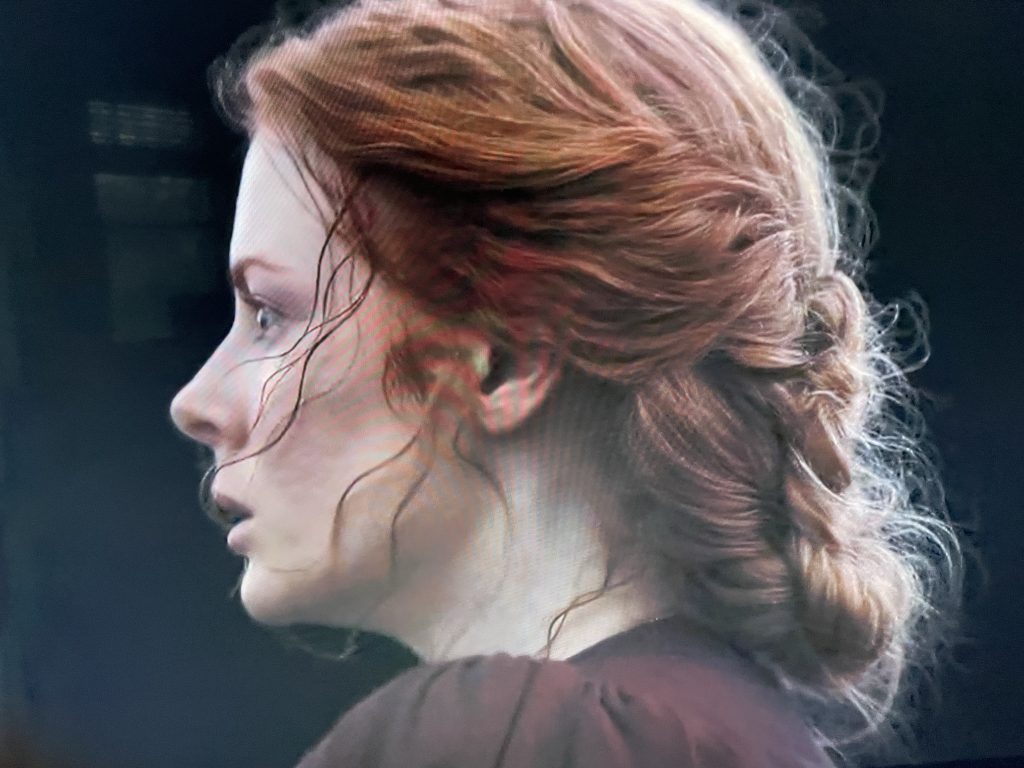
A Longer Review
1899 is free to Netflix subscribers. Eight episodes make up the first season. I rate it R for sexual content and some violence.
Baran bo Odar and Jantje Friese bring to the screen this mind-twisting mystery with a style that broods and draws in its audience. That style will be familiar to fans of Odar and Friese’s imaginative work in the time-travel story, DARK.
1899 opens with the main character, Maura Franklin-Singleton, played by Emily Beecham, waking from a nightmare. The viewer quickly learns that Maura is living in another century. The title of the series is a helpful reference point as are the period costumes. Maura is also aboard an ocean liner with hundreds of other passengers, on its way to America from Europe. She appears to be traveling alone.

From the first moment of the longer narrative arc, confusion about reality is introduced to the viewer through the character of Maura. Her nightmare before waking is a terrifying scene in what seems to be a sanitorium for the mentally ill. She is strapped into a chair and given an injection while the command WAKE UP jolts her out of sleep and into the “real” world. The audience, along with Maura, sense the nightmare holds a degree of reality as she views the red marks on her wrists, where in the nightmare, she was strapped to the chair. She quickly covers those up with her long, victorian sleeves, and heads to the ship’s upper-class dining hall. To add drama to this ship’s community at large, there is a large portion of underclass people living below deck for the duration of the cruise.
Waking from a dream becomes a thread throughout the story as other characters, some of her fellow travelers, experience dreaming and waking to the same command, WAKE UP. The stories of these characters are slowly woven together into a climax that truly surprises.
OKJA, Your Next Family Movie Night? My No-Spoiler Review
OKJA, directed by Bong Joon-ho, written by Joon-ho and Jon Ronson (from a story by Joon-ho) is yet another example of Korean film genius. This film is set in a speculative future (despite the film’s timestamp of 2007)…the scifi aspects of the story have to do with genetics. First, the short review.
6 Reasons OKJA Will Delight
- Streamable for free on Netflix, family friendly (I would rate it PG-13 for violence)
- Although there are Korean characters who only speak Korean (therefore, yes, you’ll have to read subtitles), much of this film is either visual narrative or the characters speak English
- Action-packed
- Funny and Heart-warming (the creature created for this film is cute and compelling)
- Thoughtful perspective on the food industrial complex
- With the child protagonist on a grand chase/adventure and with compassion at its core, this story feels like Studio Ghibli in all the best ways

Longer Review
Lately, when I look for something interesting and fun to watch, I gravitate toward Korean filmmakers. Why? They are some of the best storytellers around and Netflix is committed to working with them/putting their work out to the broadest audience. Moreover, Korean filmmakers don’t seem fixated on US/European political issues, which bore me these days. OKJA does touch on the industrial food complex…a global reality that is political. In particular, OKJA explores how meat is produced and processed for broad human consumption. But don’t let that stop you from watching this interesting and entertaining film. I think the questions that arise from the film are worth thinking about for every person on Earth, whether a vegetarian, vegan, or an omnivore. Kids watching this will also feel the implications of our “appetites”. It’s not a bad thing to help our youth understand that meat actually comes from creatures who live on this Earth with and among us. That’s a worthy conversation to have with our future leaders who will likely make choices for all of us about how we are to care for planet and creatures.

With an all-star cast, both Korean and US born actors inhabit this film. Stars like Tilda Swinton, Steven Yuen (The Walking Dead, Minari, Nope), Paul Dano (Little Miss Sunshine, The Batman, The Fabelmans), Yoon Je-moon (The Man Nextdoor), and Jake Gyllenhaal (Nightcrawler, Donny Darko) inhabit this universe. The protagonist, Korean actress Ahn Seo-hyun, is fantastic as the stoic caretaker of OKJA. She is the studio Ghibli-styled determined child who will not give up on her friend. This story is as much about loyalty and friendship as it is about food politics. I loved OKJA and I hope your family does too.

THAT HIDEOUS STRENGTH, A Review with Minor Spoilers
The third and final science fiction novel written by CS Lewis, THAT HIDEOUS STRENGTH, is touted by some as a fantasy novel. I hesitate to go deeper to explain why that might be, for fear of spoiling, but let’s just say that the story takes place on Earth, not in space, and one of the key characters who acts in a miraculous and decisive way to defeat the enemy, is a wonderfully fantastical character.
As I have talked with friends who have read all three, I get different answers about which is the “favorite” in the trilogy. There are individuals who love Out of the Silent Planet. I personally like it for its length…it is as short as a novella and a tight little narrative. Others love Perelandra. I appreciate Perelandra, but there are portions where reading was a chore. For me, THAT HIDEOUS STRENGTH is the true novel. It is my favorite of the three.
The Short Review: 5 Reasons I Recommend THAT HIDEOUS STRENGTH
- Compelling main character(s) both grappling with interior life, particularly with identity and faith
- A rich setting, a modern academic world and progressive (Lewis’ words) university leadership that feels creepy, yet familiar
- An amorphous and terrifying villain, well written and historically relevant
- In the midst of the horror, a comedic twist that feels like a Shakespeare switch-a-roo
- A companion novel to 1984. Many minds in this era of the 20th century understood the tyranny of government control. Lewis and Orwell were cut from that same cloth. Warnings that are relevant today and always.
For me, the young married couple, Mark and Jane, makes this story compelling in a way that is unique among the three novels in the trilogy. Jane is a crucial player and well developed. In the previous novels Lewis did not present the reader with a compelling female lead who was relatable. The Perelandra Queen is wonderful, but otherworldly. Jane, in this book, is utterly relatable. Her discomfiture with domestic life, her struggle with a husband who is caught up in his own professional world, felt deeply real. Mark is also real. Lewis highlights his hubris and insecurity, showing the reader how one might choose to align oneself with a horrific community. Mark’s longing for belonging, his hope for recognition are powerful human motivators and have the capacity to diminish the moral spine, especially if that spine is wobbly (as Mark’s is). Despite Mark’s poor choices, I got the feeling that Lewis, like the deity he knows and loves, has not given up on this lost soul. When Mark sinks low enough and faces the worst of himself, there is a promise of redemption.
THAT HIDEOUS STRENGTH is a story with complex layers. The deeper conversation about nations and their “haunting” is a topic I will not cover in this review, but in case you’re wanting to understand more, an article in The Imaginative Conservative called America’s “Logres”: The Mythology of a Nation helped me muse on what might be the American Haunting. That conversation is a crossover of the spiritual and the literary and takes the reader deeper into the mind of CS Lewis and those who were writing in like spirit, JRR Tolkien being one of those writers.
PERELANDRA, A Review
PERELANDRA is the second installment in CS Lewis’ space trilogy. Below is my no-spoiler short review, but the longer review that follows the image of PERELANDRA’s cover, will contain spoilers…beware. This is not a children’s book, but I recommend this novel to all ages who like the story. For all readers, taking the time to discuss after or along the way will deepen philosophical and theological understanding.
Link to OUT OF THE SILENT PLANET for a review of the first book in the trilogy.
5 Reasons to Read PERELANDRA, A Classic Science Fiction Story
- One of the more unique portrayals in literature of paradise and/or a pre-fallen world
- Beautiful CS Lewis prose
- The ideas are put forward clearly and by someone well acquainted with 20th century ideas
- Finally…a strong female character (there were none in the first novel)
- Read all three to make sense of what Lewis was trying to accomplish in the longer narrative arc
3 Reasons PERELANDRA is My Least Favorite of the Trilogy
- There are so few characters and the villain does not arrive until about 1/3 of the way into the book
- Not a lot of drama…there is a slow build and eventually, high drama, but it takes the novel a while to arrive (see #1)
- A lot of speech-making in the final pages. Interesting ideas, but coming at me in my least favorite non-dramatic package
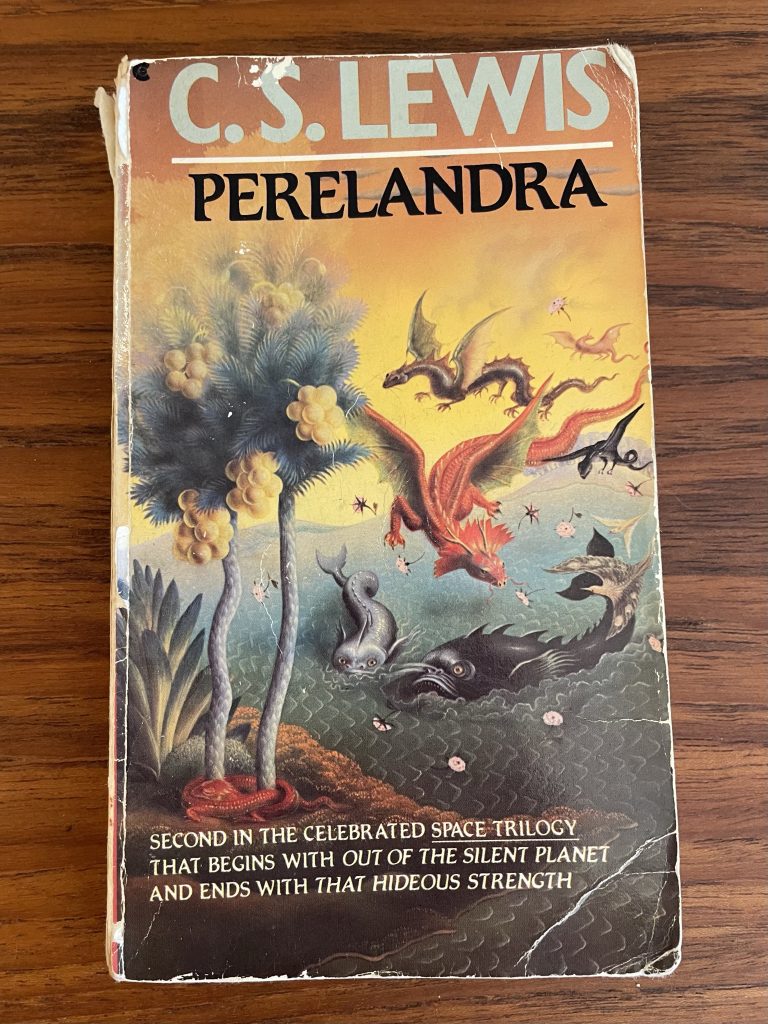
The Longer Review (With Spoilers)
While PERELANDRA is my least favorite of the three books Lewis wrote in the scifi genre, it does have its merits.
For one, anyone who has read his Narnia books, knows how well CS Lewis puts his imagination on the page. He has the ability to create a world both strange and fabulous and took on a bold task to put before the reader a paradise, a pre-civilization and pre-fallen planet with only two human-like people. Basically, he created an Eden. And how would one write this in a convincing way?
This excerpt, one of many examples…just gorgeous.
Now he had come to a part of the wood where great globes of yellow fruit hung from the trees–clustered as toy-balloons are clustered on the back of a balloon-man and about the same size. He picked one of them and turned it over and over. The rind was smooth and firm and seemed impossible to tear open. Then by accident, one of his fingers punctured it and went through into coldness. After a moment’s hesitation, he put the little aperture to his lips. He had meant to extract the smallest experimental sip, but the first taste put his caution all to flight. It was, of course, a taste, just as his thirst and hunger had been thirst and hunger. But then it was so different than any other taste that it seemed a mere pedantry to call it taste at all. It was like the discovery of a totally new genus of pleasure, something unheard of among men, out of all reckoning, beyond all covenant. For one draught of this on earth wars would be fought and nations betrayed.
Elwin Ransom, a professor of philology, is the narrator here. He was also the protagonist in Out of the Silent Planet. In this excerpt, he is telling his tale to a fictionalized version of CS Lewis after returning from his mission to the planet Perelandra. Ransom was sent to Perelandra by the angelic ruler of Mars (Malacandra). The reader is acquainted with this ruler from the previous book. In Out of the Silent Planet, Ransom is kidnapped and brought to Malacandra. That is where he meets Oyarsa, the ruler of Mars. Oyarsa does make an appearance in this novel, as does Weston, one of the academics who kidnapped Ransom in the first story. Weston, the primary rival to Ransom, acts as the tempter in this narrative. He does this not by his own cleverness and strength, but by something more frightening. Weston has given himself over to the bent angelic ruler of Earth, Satan. After Weston arrives on Perelandra in his space vessel, Ransom comes to understand his mission, that he has been sent to thwart the bent Oyarsa by thwarting Weston.
In the story, Weston is an academic with the worst intellectual vices; hubris combined with a flamboyant humanism that borders on narcissism. Tragically, he falls under a true evil in his search of spiritual answers to the mysteries he experienced on Malacandra. Weston’s journey into evil reads like something out of a horror novel (or the Bible).
“Idiot,” said Weston. His voice was almost a howl and he had risen to his feet. “Idiot,” he repeated. “Can you understand nothing?…This is the old accursed dualism in another form. There is no possible distinction in concrete thought between me and the universe. In so far as I am the conductor of the central forward pressure of the universe, I am it. Do you see, you timid, scruple-mongering fool? I am the Universe. I, Weston, am your God and your Devil. I call the Force into me completely…”
Then horrible things began happening. A spasm like that preceding a deadly vomit twisted Weston’s face out of recognition. As it passed, for one second something like the old Weston reappeared–the Old Weston, staring with eyes of horror and howling, “Ransom, Ransom! For Christ’s sake don’t let them—” and instantly his whole body spun round as if he had been hit by a revolver-bullet and he fell to the earth, and was there rolling at Ransom’s feet, slavering and chattering and tearing up the moss by the handfuls…
I was in my thirties the last time I read PERELANDRA and I did not remember how clearly this Weston character gives himself over to evil. Nor did I remember that Ransom comes to the realization that he will have to destroy Weston in hand to hand combat if he is to defeat him.
That Ransom believes he must assassinate his rival provoked my horror. Moreover, the scenes of his battle with Weston are brutal. Lewis does not hold back on that reality, but the idea of this existential battle brought to mind Dietrich Bonhoeffer. Lewis might never have known Bonhoeffer personally, but the ideas Bonhoeffer was writing about and preaching about (in Hitler’s Germany) were likely familiar to him…as they were to every thinking Christian of the time.
Bonhoeffer, while struggling to be a faithful clergy member under Nazi rule in Germany, came to terms with the idea that it was in fact a righteous or just act to kill a man who had fully given himself over to evil. That is why Bonhoeffer was executed in the end, as he played a role in an assassination attempt against Hitler. Below is an excerpt of a sermon on Colossians 3:1-4, a sermon he gave most likely after he had made the decision to collaborate with a part of the resistance determined to assassinate the Fürher.
“Instead, and precisely because our minds are set on things above, we are that much more stubborn and purposeful in protesting here on earth… Does it have to be so that Christianity, which began as immensely revolutionary, now has to remain conservative for all time? That every new movement has to blaze its path without the church, and that the church always takes twenty years to see what has actually happened? If it really must be so, then we must not be surprised when, for our church as well, times come when the blood of martyrs will be demanded. But this blood, if we truly have the courage and honour and loyalty to shed it, will not be so innocent and shining as that of the first witnesses. Our blood will be overlaid with our own great guilt.” (DBW 11, 446) (Schlingensiepen, Kindle Location 2427)
Bonhoeffer’s words evoke the idea that a conservative church is potentially an anemic one. His mention of our great guilt in the sermon I took two ways. One, the church is guilty when it does not act (or waits too long) to stand up to evil. Two, if it does join the revolutionaries, it potentially falls under the guilt of questionable acts. When evil can only be defeated by an act that lays outside of the norm of Christian ethics, there is plenty of guilt to go around. However, Bonhoeffer did not shrink back from taking on that guilt for what he (and history) thought to be the greater good. Moreover, his writings on this remain strong pillars in just-war theory and the Christian struggle with realism versus pacifism.
Lewis travels a similar line of reasoning in this novel and it should not surprise the reader that when the character Ransom leaves the planet Perelandra, he leaves having accomplished his task, but with a wound on his foot that refuses to heal this side of heaven.
OUT OF THE SILENT PLANET, A No Spoiler Review
OUT OF THE SILENT PLANET, by CS Lewis came about as a result of a coin toss between JRR Tolkien and CS Lewis in the 1930s. The understanding between the two men; one side of the coin would mean writing a science fiction novel, the other side would mean writing a time travel novel. The coin was tossed, Lewis was assigned the scifi novel. Tolkien was assigned the time travel novel. Tolkien never wrote his. Lewis did, published in 1938, twelve years before Narnia. In fact, he wound up writing three books of science fiction. OUT OF THE SILENT PLANET, which I will review here, was the first. This story is sophisticated, but there is no reason a YA reader or a very learned middle grade reader cannot take on this story. For educators thinking about assigning this book to a young person, a solid discussion on the story would make the experience a profound one.
The Short Review: 4 Reasons to Read OUT OF THE SILENT PLANET
- Superb writing and because this is CS Lewis, when you’re finished reading, your brain will have expanded
- Scintillating ideas that awaken the conscience…Plunge yourself into the mindset of a WWI veteran and a brilliant observer of history and soak in Lewis’ crucial critique of pre-WWII Europe
- Absorb Lewis’ Christian concept of God/Creator…the beauty and the moral implications
- Gain a vision for the power of fiction (imaginative science fiction in particular) as a way to change hearts and minds.
A Few More Details:
When Lewis and his friend and colleague, JRR Tolkien, both veterans of WWI, decided to toss that coin, they had been musing together about the sad state of fiction. They believed that the godless universe theory unleashed to some degree by Darwinists and proponents of the Hegelian superstate/superman, was giving rise to real beliefs (like eugenics which both understood as dangerous and evil) inside academia and government. More troublesome, these theories were making their way into fiction and infecting the broader population through story.
Americans fought in WWII and helped to defeat Hitler, so my nation (I am a US citizen) often forgets how the eugenics movement in the US was accepted and backed by some of our highest state actors, like President Woodrow Wilson. We in the US forget, maybe conveniently so, that we too were traveling on a similar road as the Nazis. This is how pervasive these ideas were and back in that day, they were considered progressive. It turns out, anything can be labeled progressive. A cautionary and hopefully humbling reminder to us in the 21st century.
Marxist ideology was also suspect in Lewis’ eyes. Both Marxism and Fascism preached an exercising of power where the end justifies the means. That idea was an abomination to Lewis and Tolkien, the rejection of which made its ways into the Lord of Rings trilogy, as it did into all of Lewis’ writings. As Christians (Lewis, an Anglican, Tolkien, a Catholic), they challenged the idea that the state has permission to sacrifice an individual for some greater good, not without that individual willingly giving up her/his life, soldiers willing to fight to defeat the existential enemy of a free state being one example of this proper sacrifice, something both of these men witnessed first hand.
In regard to reading OUT OF THE SILENT PLANET, knowing a little 20th century history and philosophy definitely helps the reader enter into the world of Elwin Ransom, the hero of the story, but even without that knowledge, this is a fascinating and well written tale. Ransom, a philologist, is on a walking tour of rural England. He is kidnapped and taken to Malacandra (the planet Mars). What unfolds is a story about relationship and curiosity (Ransom’s journey) versus dominance exercised by violence (the journey of his kidnappers). The narrative provides a resolution that exemplifies the idea that there is a standard of justice that is literally universal.
This is my third time reading OUT OF THE SILENT PLANET (notice my beat-up copy in the image above…not sure it will survive another read-through) and after finishing the book this round, I found myself dreaming about grace and kindness and goodness while I slept…something that doesn’t often happen for me after reading science fiction before bed.
THE SILENT SEA, More Brilliance From the Korean Film Industry, A No-Spoiler Review of the Netflix Miniseries
First, the Short Review
6 Reasons I Recommend THE SILENT SEA
- Beautiful production overall, including visuals that underlie the creepy vibe
- Featured a number of my favorite Korean actors, a few you might recognize if Squid Game was on your watch list this past year
- Plenty tension and surprises/frights
- A number of science fiction and haunted house tropes embedded in the story and various characters (see more in longer review)
- The relationships and particularly, the relationship to authority feel authentically Korean. (also, see longer review)
- You know I love the miniseries genre, 1-hour installments of great storytelling that comes to a conclusion without an agonizing cliffhanger
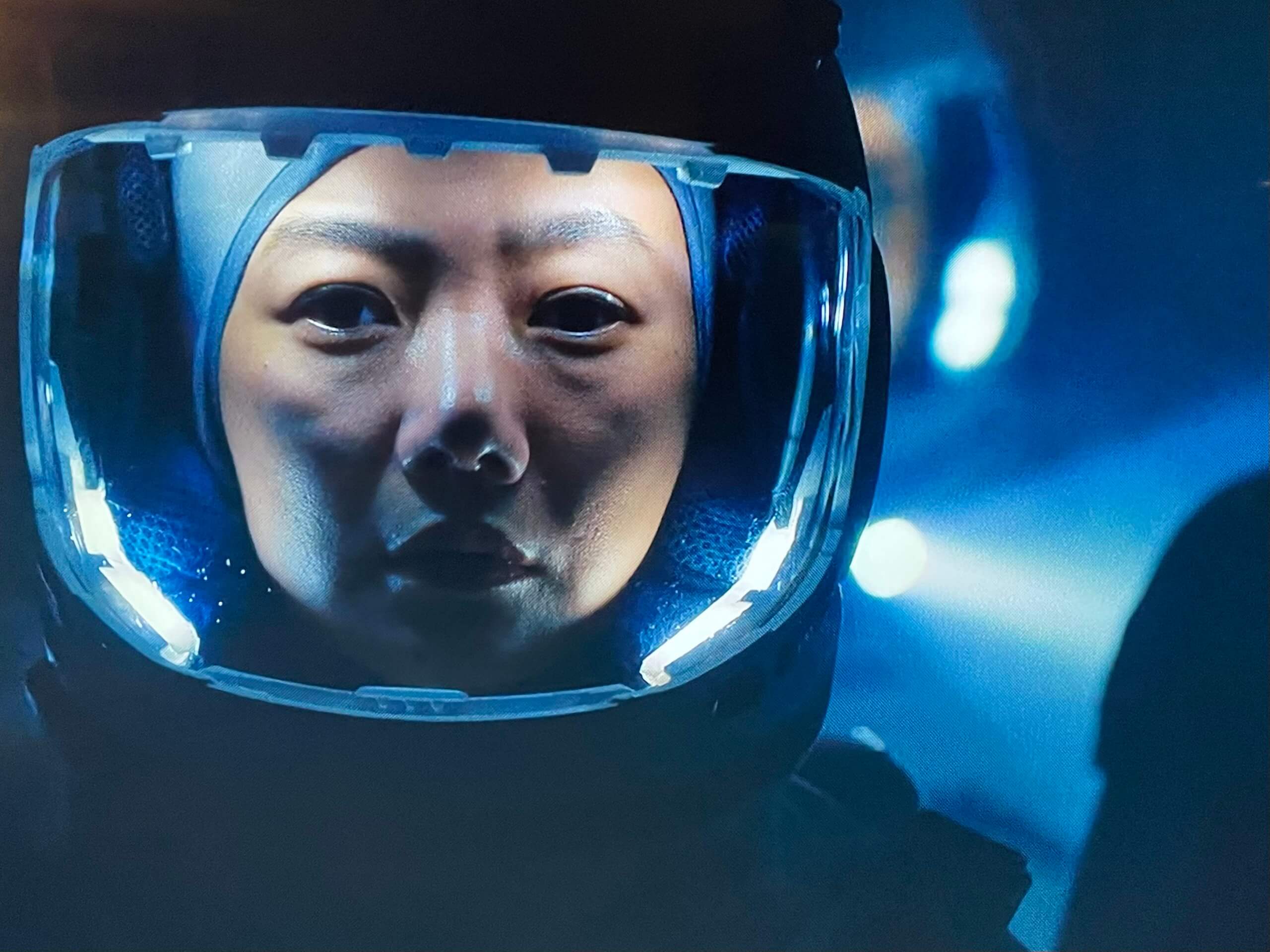
Longer Review
SILENT SEA is the story about a mission to the moon to find water. I rate this series PG-13. No sexual content in this production, but there are dead bodies, and some gore. Family-friendly if your teens are mature. It’s a fun, suspenseful ride.
The first episode quickly gives the viewer the high stakes for this mission. Drought has plagued the Earth. Water is the resource most valuable and due to its scarcity, the planet has become a wasteland. Water is rationed to such a degree, many have suffered physically, billions have died. The wealthy nations have gone into space to find a water source. Most abandoned the idea of finding water on the moon after searching, but the South Korean government kept snooping. There has been a top-secret program at a large moon station that was believed to have borne fruit, but suddenly…the experiment falters. Everyone dies all at once on the moon station. The earthbound directors, including Heo Sung-tae (pictured near end of review) initiate another mission to go to the station and investigate the truth, but secrets pulse underneath the surface of this mission and become one aspect of tension in the story. The authorities hold their cards close and the military and science leaders do not push back, though they suspect something fishy. This may or may not be an aspect of Korean-specific deference to authority, but the screenwriter exploits what I understand as deference in a way that serves the story. Also, this is where the nuanced acting plays such a powerful role in the unfolding of the narrative. The audience can see in the face of Bae Doona, the slight suggestion of twitch, a blink, a stern jaw…we see it, but barely and it helps us know that she understands that she is being deceived. Yet, in most of the outward behavior, she acts the true soldier. Doona is great at this nuanced acting, but she’s just one, among a number of these performers, who pull off such nuance. In my mind, THE SILENT SEA showcases superb writing and better acting than Squid Game. Click for a review of Squid Game

Once the mission lands on the moon, what unfolds reminded me of Ridley Scott’s Alien, in all the best ways. Yes, there will be corpses, tunnels, darkness, betrayals, a terrible and contagious sickness, but there will be one character who keeps her eyes on the prize. Dr. Song (Bae Doona) is intent on discovering the truth. In part, she seeks the truth because her sister is one of the corpses and the holder of many of the secrets. Doona as Dr. Song, pictured above, is a female lead in the Korean zombie series, Kingdom. To see my review of Kingdom, click here
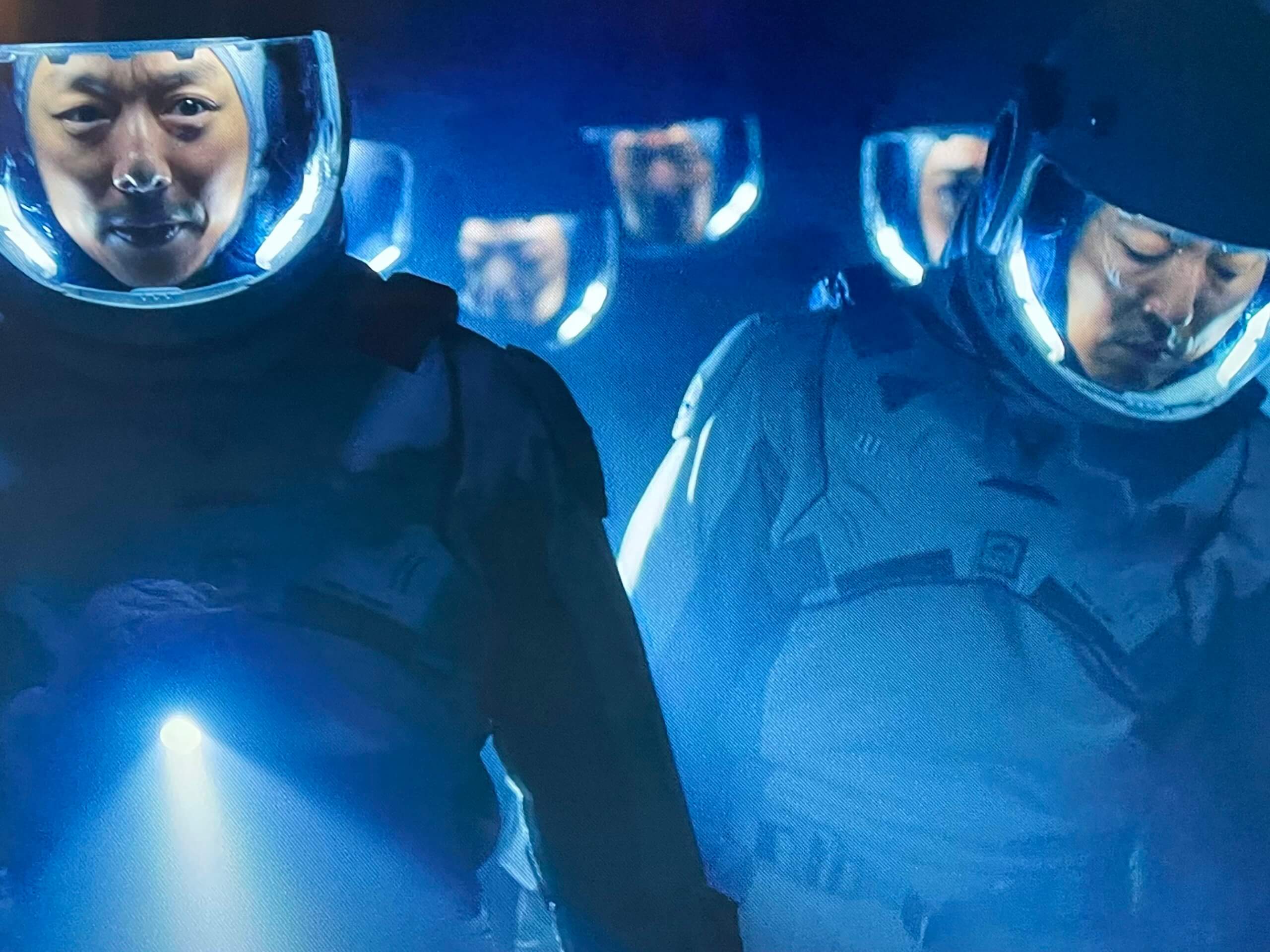
I beat this drum a lot but I do feel that Netflix streaming continues to find the best international productions and when it comes to science fiction, the Korean film/media community is putting out a lot of great product. Produced by Jung Woo-sung, directed by Choi Hang-Yong, who deftly handles the brilliant storytelling of screenwriter, Eun-Kyoi Park. Honestly, I think I could teach a five-hour course on writing with this series, moving scene by scene through the screenplay, in terms of a classic sci-fi thriller. Fun fact, this story (as did Scott’s Alien), closely follows the haunted house template. That means there are a few predictable tropes. The audience knows that the mission is doomed (at least the mission as it was originally conceived) as one by one, the team gets whittled down. Who will remain in the end…that is what the audience wonders. Regarding the various characters, the majority of them hold their own, each having his/her own arc, including the wise-cracking military scrub who just wants to go home…a longing the audience suspects will not be realized.
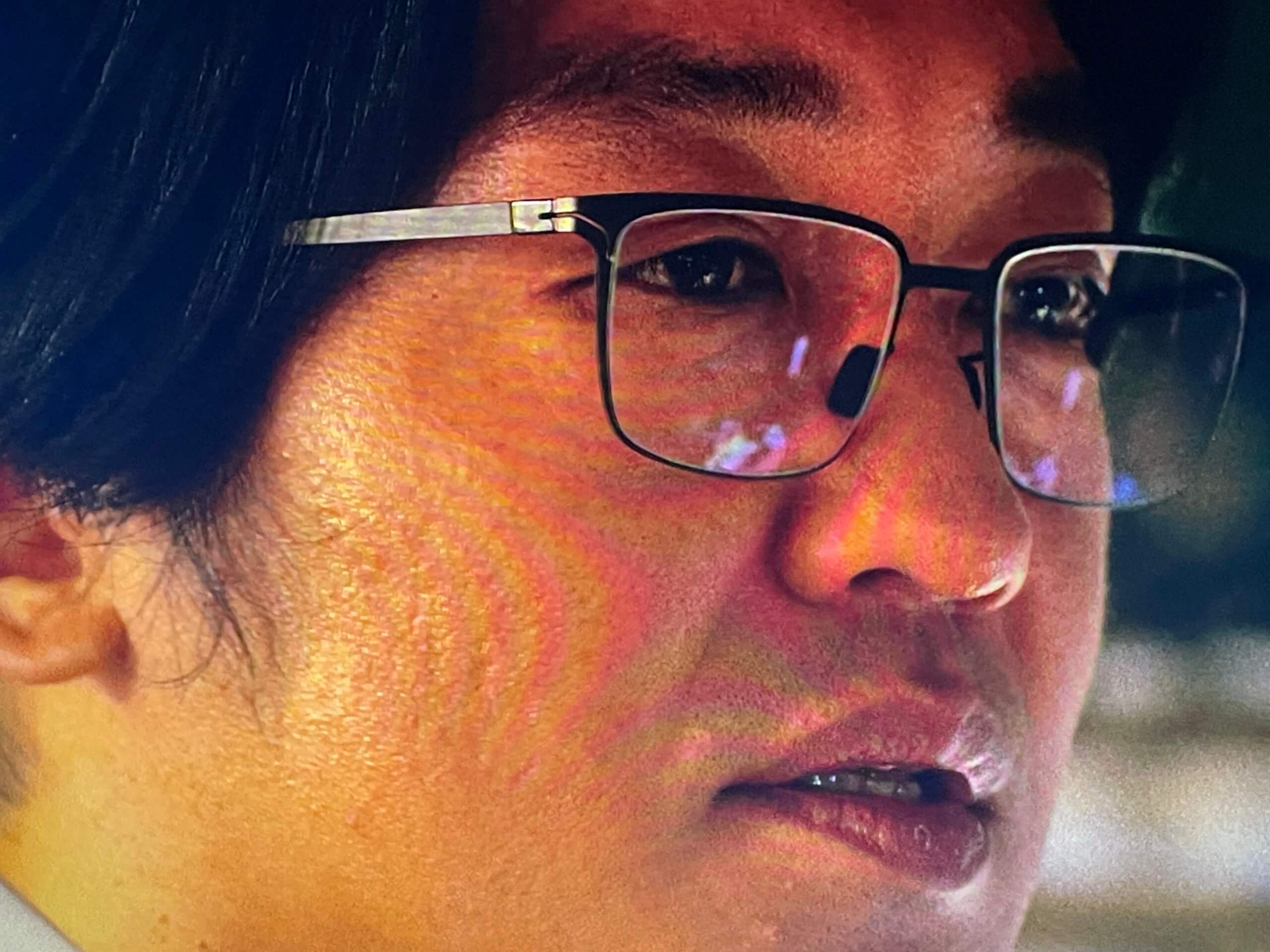
I highly recommend. THE SILENT SEA, and suspect that Netflix now has me pegged in its algorithm as a person who loves Korean-produced thrillers/sci-fi. I might need to give the Koreans their own category on my site. The product is so good, I can’t stop watching and when I watch, I always review.
ALL SYSTEMS RED, by Martha Wells, A No-Spoiler Review of the first novella in the Murderbot Diaries Series

ALL SYSTEMS RED is a story, entertaining and well-written, that one can read in about 4 hours. Rated PG-13 for adult themes. I read this novella on a flight from Minneapolis to Seattle. I flew on Delta and none of the airline’s tv/film options seemed very thrilling to me. I often try to see HBO or Showtime options when on a flight because I don’t subscribe to either of those services in real life. Thank goodness I had taken this book with me, hardback, but thin, lightweight and easy to pack because it’s only 127 pages.
And now, for my Short, No-Spoiler Review
I highly recommend ALL SYSTEMS RED for these 5 reasons.
- Original voice…the narrator has the appeal of an innocent, he/she is like a child, yet holds the capacity to narrate a futuristic society inhabited by humans and AI living and working together
- Genre bending…science fiction merged with mystery…in other words, a page-turner
- Thought-provoking ideas about AI and how future humans might understand morality/humanity in regards to AI
- Interesting world-building and a great set-up for subsequent stories
- ALL SYSTEMS RED would make a great audiobook. See the longer review for more
Longer Review:
Martha Wells has created a fascinating universe of humanity working and living off Earth, in space, in places that can only be reached via light-speed travel. She doesn’t fixate on the physics of the issue (regarding traveling across vast distances) but focuses on the gritty work life of humans and their bots. In the author’s futuristic world, full AI exist as sex workers and security units (SecUnits) and other helps in life. Also, some humans adopt robotic parts (augmented humans). So, there is a mix of how humans have integrated with tech and within the story world, there is little “judgment” about these realities.
While this is all true, the AI mind that narrates this story has a judgment about itself and humans. The view is not completely skewed toward disgust for humans, though there is some leaning in this direction. Granted, I’ve only read the first 1.5 novellas. But what works in the narrative is that Wells has put forward a more dispassionate, yet charming view of the world the way it is. I highly recommend these novellas as entertainment and am slowly discovering how they speak into deeper moral questions around humanity’s race toward the future, a future in which robots and artificial intelligence will be embedded. These books might appeal to the YA reader because the narrator is endearing and “young” feeling. The value in their education would be the discussion around tech and humanity’s future.
Regarding the narrator. The voice is absolutely charming. I did not listen to the book, but can imagine the voice. This book would be a pleasure to listen to.
To buy the first book, click on All Systems Red
Four of the series in hardback can be bought together. Click on Murderbot Diaries
For the least expensive version to try out novella #1, click on Kindle version: All Systems Red
For the audio version of novella #1, click on Audio of All Systems Red
